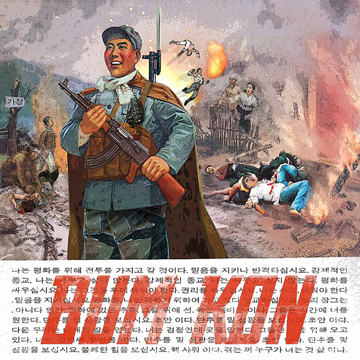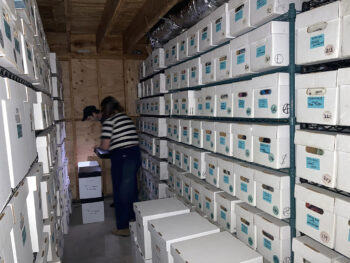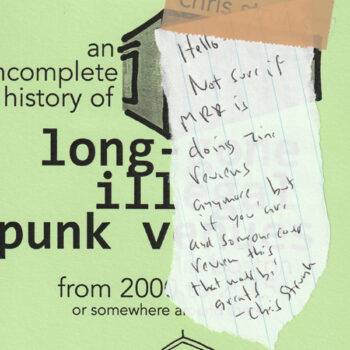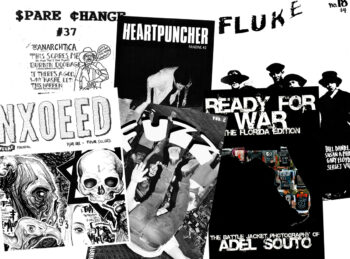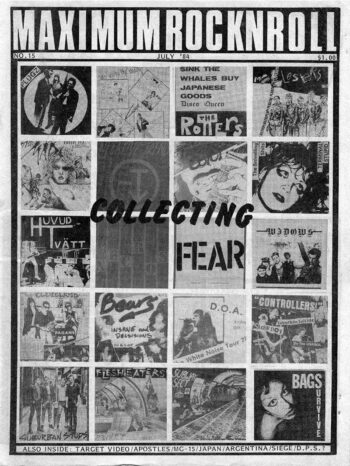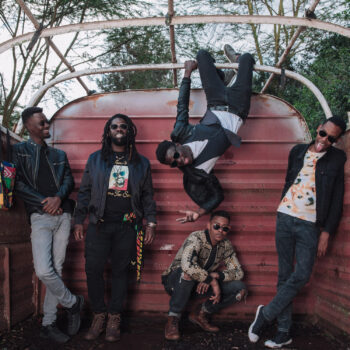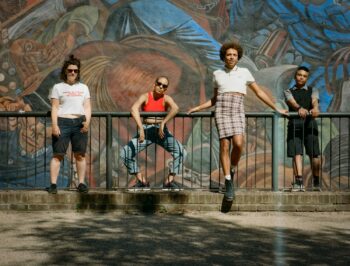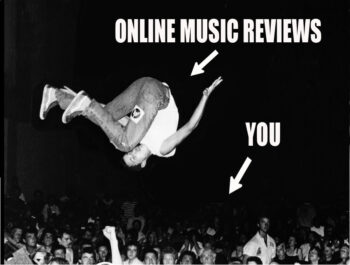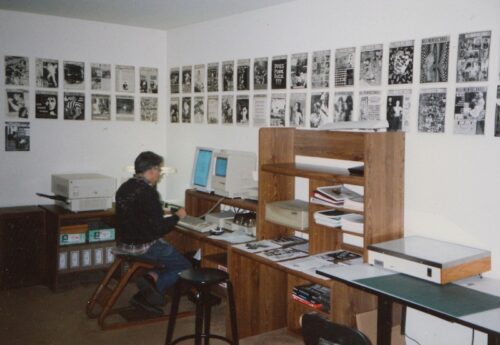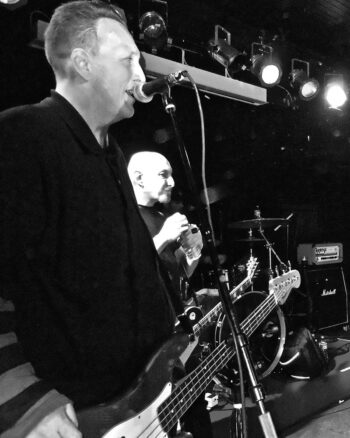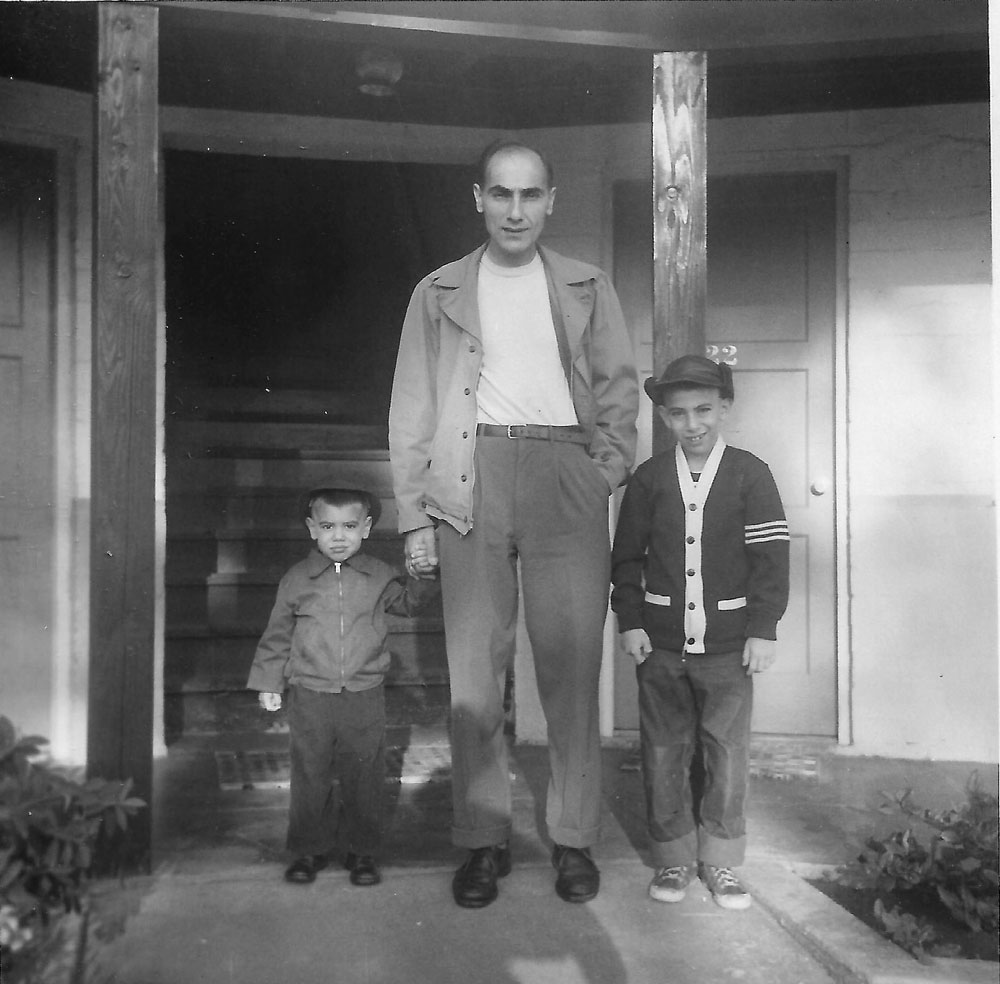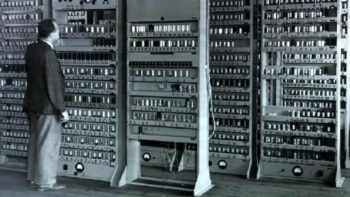Blast From the Past: Bum Kon
This interview originally ran in MRR #305 which you can pick up from our back issues page here

I don’t know what it’s like now for kids growing up in this modern age—what with the internet, MySpace, mp3s, filesharing, YouTube, and whatever else—but back in my day (the ’90s) you found out about music from your friends. I’m talking about actual real-life in-person interactions (remember those?), or trading tapes through the mail. I’ve got a couple people whose taste in music I trust above all else, and when one of them whispers the name of a band, my ears instinctively perk up. That’s what happened when I heard, “Chris, do you know this group Bum Kon?” A little subsequent research told me they were an early Colorado hardcore band, that they had an EP from 1983 called Drunken Sex Sucks, and that they were named after a Korean policeman who went on a killing spree. Yeah, sounds like it could be cool… Now how do I track down a recording?
Fast-forward a few years, and I make my way out to San Francisco, where Maximum Rocknroll has a library of over 45,000 punk records. Bum Kon was one of the first I pulled out to tape—along with Raw Power Screams from the Gutter LP, Rattus WC Räjähtää LP, the Feederz Jesus EP, the Stalin Mushi LP, October Days 12″, and a couple other as-of-then un-reissued classics. I don’t know what I liked more about Bum Kon—the breakneck-speed blasts of adolescent hardcore punk fury, or the genius art on the cover of the EP.
I soon landed a job working at one of the few remaining major independent music distributors in the country here in SF, where among my co-workers was not only Andrew Murphy, former Denver resident and proprietor of the Colorado-centric Smooch Records, but Bob McDonald, former vocalist of the band Bum Kon. It was during the mastering process for Local Anesthetic, Andrew’s compilation of early Colorado punk singles, that the complete, unmastered, and largely unheard-since-1983 session for the EP turned up. I expected it to be good, but fuck… this thing needed to be released. Though a couple other labels were interested, Andrew’s Smooch imprint was the natural choice. I was thrilled when he asked if MRR wanted to co-release it! Now, with the complete 25-track 1983 recording session out on CD, and the vinyl version coming later this month, we thought it was the perfect time to do an article for the magazine.
Andrew and myself conducted the following interview with Bob McDonald and Johnny Meggitt in August of 2008. Besides doing vocals for Bum Kon throughout their entire career (the EP and two LPs) as well as the illustrious and infamous Bad Circus, Bob more recently sang for the band Mr. & Mr. & Mr. & Mr. Evil, and fronts Hank IV (LP out soon on Siltbreeze!). Johnny is also a veteran of the early Colorado hardcore scene, having been in Child Abuse, Acid Ranch, Brother Rat, and Bad Circus. He was also the vocalist of the now-defunct Subtractions, and currently plays in the Get Offs. We spoke about Bum Kon, their contemporaries in the Colorado scene at the time, Bob and Johnny’s experiences getting into punk in Denver, and quite a bit more. Just prior to the interview, the four of us watched an old video shot at a show in Fort Collins, CO, in 1984. The footage featured performances by Bum Kon, Acid Ranch, and Peace Core, and interviews with members of the band and the audience.
Introduction by Chris Hubbard.
MRR: Do you want to start by sharing your memories of what you just saw? That was 1984.
Johnny: That was ’84, so a lot had happened by then. And a lot of that happened in Boulder before I saw Devo on Saturday Night Live or whatever got me into it, y’know, which is when I first started thinking, “huh, maybe not the Stones.” But there were already people in Boulder who were so far ahead of us, partying so much harder than us. [laughter]
Bob: I got into punk rock through Gerry O’Reilly. I worked at this hamburger restaurant called Round the Corner, and this dude—his family, they had moved from Belfast, ’cause his brother was in some trouble, and his dad got a teaching job in Colorado. He was all into the Stranglers and the Stiff Little Fingers, and he took me under his wing.
Johnny: And his family—it was Gerry and his brother Devon—they were taken out of Northern Ireland because of the IRA and the whole war, basically.
Bob: Well, as his brother always said, “I got into some trouble and had to leave.”
Johnny: And their parents didn’t want him to be in the IRA, so they just became straight-up punk, y’know? Like, Stiff Little Fingers to them was like the Beatles to me at that time.
Bob: Gerry took me to see the Ramones and the Dictators.
Johnny: That was probably 1980.
Bob: ’79 or ’80. I got into an argument with Handsome Dick Manitoba once about when it was. [In H.D. Manitoba voice:] “I would know.” [laughter]
MRR: So are you two both from Colorado originally? Did you grow up there?
Bob: Yeah. He was born in Dugway, Utah, on an army nerve-gas testing base, and I was born in Wichita, Kansas.
Johnny: We both grew up in Denver, and we met in high school, the same one where a lot of those people in that video went—Erik Oberhausen, Jenny Thero, Mike Serviolo, Chris Steele, all the bands.
Bob: We all went to the same high school.
Johnny: So it wasn’t like we all got into punk and then met in high school—we were all getting into new wave and punk while we met, and were kind of teaching each other, like, “Wow, have you heard Minor Threat, have you heard this or that?” Y’know? Because we didn’t come up in ’77 or ’78. I got to high school in 1980. It was a short hop, for me, from the Monkees to all of a sudden being at a matinee show and seeing Black Flag.
 MRR: Was there a previous generation, like a ’77 generation?
MRR: Was there a previous generation, like a ’77 generation?
Johnny: Definitely. In Denver, it was more of a new wave thing, but in Boulder there were punk bands. We never heard them, we just saw their remnants, their little brothers or sisters that came up in the same punk scene that we came up in, really.
Bob: There was the punk scene, and then, as we came, that was the hardcore scene.
Johnny: Yeah, it definitely wasn’t a punk scene, it was a hardcore scene. And it was White Trash, who were Boulder-based; The Frantix, who were Aurora-based, a Denver suburb—those guys were from all over the ’burbs. The suburban guys were playing more true hardcore; Bum Kon was the only city band that was really playing hardcore, ’cause Peace Core was punk…

MRR: What about Child Abuse?
Johnny: Child Abuse, y’know…
Bob: That was punk.
Johnny: That was punk. That’s the only word for it when everybody’s playing on the same root note.
Bob: They had trashcans for drums. Before Jason could get a drum set, they played trashcans.
Johnny: I remember he was like 14; he got his first drum set and we thought, “I wonder if he can play that thing,” and he sat down and just was like… [makes drumming noises] “Yeah, I’m ready.” And we went, “Well, he can play.”
Bob: We used to just form zillions of bands, just for fun. Johnny and I were in… You were in S.R.A. right?
Johnny: Skaters Rule Always. [laughter] One hundred songs in fifteen minutes.
Bob: We would play on our skateboards with helmets and pads.
Johnny: There was that skateboard-guitar down there than inspired it. What was that guy’s name? He played with Steve Lobdell, who’s a pretty accomplished guy, in a band called Signal 30. Bart…
Bob: Oh yeah, Bart Davenport.
Johnny: There were two Barts—Bart Davenport…
Bob: Oh yeah, the rat…
Johnny: No, that was the other Bart, that was the weasel. There were these weird little inside things in the scene, like there was the Weaselhood—that was Nate, that was the three of us, we all had weasel faces… [laughter]
 MRR: So, was Bum Kon your first band, or was that just another in the series of bands at the time?
MRR: So, was Bum Kon your first band, or was that just another in the series of bands at the time?
Bob: No, my first was Problem Youth, and then they kicked me out ’cause I wasn’t punk enough. As I recall, it was ’cause I started wearing these Chinese slippers and I had a trenchcoat. [laughter] And then Dan, the bass player—he and I had started that band—he moved from bass to vocals and they changed their name to Peace Core. And then Erik, the bass player of Bum Kon, and I—we’d been good friends in junior high and hung out together—there was a Hüsker Dü all-ages matinee, and after they were done playing, they just said, “Does anyone want to jam, play our instruments?” And Erik and I jumped up, and Larry and Mark, who were from the suburbs, jumped up, and we did the Black Flag version of “Louie Louie,” and we all kind of looked at each other, like, “well, that was kind of cool.” [laughter]
Johnny: People danced… I mean, talk about a good first show—you played one or two songs, and people liked it.
MRR: So that was ’82, probably.
Bob: ’81, ’82. It might have been ’81.
Johnny: It probably was late ’81, ’cause you guys—remember? You guys were Reagan Youth for a little bit.
Bob: Yeah, that was after I left. They were Reagan Youth, and then they were Peace Core when they found out there was a Reagan Youth already. [laughter]
Johnny: Didn’t Mark and Larry…
Bob: Oh yeah, they were in a different Reagan Youth. [more laughter]
Johnny: They were in a different Reagan Youth. There were a lot of Reagan Youths.
Bob: Apparently some of our songs were written by that other dude that I didn’t know about, until he found out…
Johnny: Those guys were jamming together, and you and Oberhausen had gone to high school together…
Bob: And junior high.
Johnny: You went to Led Zeppelin school together and marijuana school together. [laughter]
Bob: Yeah, that’s true, then I stopped hanging out with those guys when they started listening to Rush. [laugher] I just didn’t get it. And then we didn’t hang out the first year of high school ’cause they were listening to Rush on the South Lawn and I was getting into punk. That summer, I went up to the Reservoir to see if there was anything going on…
Johnny: Congress Park.
Bob: Yeah, and they were like, “Bob!” I didn’t recognize them ’cause they all had short hair. We all started hanging out again.
Johnny: Congress Park Reservoir, you can see it in Dazed and Confused. It has a tower. It’s the same thing as that scene in that movie where stoners and freakers would just roll up a keg, and you’d sit there and it was really that scene that turned a lot of people onto punk rock and new wave, ’cause it was like… God, even at 14, you’re like, “this sucks,” y’know? This is just a bunch of hippies getting high. That’s really what the scene sprung out of, though—the hate of stoners, I think. At least for kids in my neighborhood that got into new wave and punk rock. It was like, we’re just too young to hang out with those ’70s freakers, y’know—they just sort of looked down on us—and then here was something you had that was yours. And the first thing was Devo on Saturday Night Live playing “Satisfaction.” I remember watching it with a couple friends, going, “wow, this is so much better than the Stones.” [laughs] It was like, “we don’t need pot, we just need beer and new wave!”
Bob: For me, that little spark was Devo, ’cause Erik’s dad had “Jocko Homo,” and we’d come home after junior high, we’d go to the Oberhausens’ house and dip into his parents’ weed stash, and get really baked on his dad’s homemade bong. His dad had cool records and brought home the Devo record, and Erik was like, “check out this weird thing.” We got really baked and put it on, and were like, “wow…”
Johnny: He’d come in, though—we’d be listening to something really good, like Black Flag or Circle Jerks or something, and he’d come in and be like, “no, no, you guys gotta listen to this,” and put on Bad Company. [laughter] It was like, dad was going to school us. [more laughter]
Bob: No, it was like that with Zeppelin—he was mad that we liked Zeppelin, and he was like [in Dad voice:] “No, the Yardbirds.” [laughter]
Johnny: We digress…

MRR: I remember one time you told me about listening to Damaged for the first time…
Johnny: Yeah, with Mike Serviolo. We threw almost all my other records out the window. And then we went and picked them back up, ’cause my mom was like, “pick those up!” [laughs] And we trashed my bedroom, which was really cheesy… I remember Bob or someone else at school talking about Damaged. I’d heard Black Flag at parties and stuff, but I’d never bought the 7-inch or anything at that point…
Bob: For me, I listened to all the English punk rock stuff, me and Dan from Peace Core…
Johnny: Everybody did, originally.
Bob: …and then this guy that I’d known in elementary school, Geoff Paxton whose family had moved away, he moved back and he was into punk. I went over to his house, and he had the Nervous Breakdown 45 with a big chunk missing out of it. [laughter] He was like, “check this out,” and put it on, and I was just hooked. Then I started… We had Wax Trax Records, which was great because they carried every new record, every punk record you wanted, so right then, any money I had, it was like—LA hardcore, y’know? They had a special section for LA hardcore. It was good.
Johnny: Yeah, I started shopping at Wax Trax in like fourth grade or something. I’d go there and get Beatles records, the Monkees, the Kinks…
Bob: Zeppelin bootlegs…
Johnny: That day, after school, Mike Serviolo and I listened to Damaged, both sides, and we were looking through my records for something else to play, and there was not much else in there. [laughs] We just kept playing it over and over again and jumping around my room, and we started throwing all my old rock records out. [laughs] Man, I wish I had those back now—some of them, y’know? Even the Beatles, who I loved growing up, were just out the window. Black Flag, I think that changed everything. In Denver, too, when they played that matinee show, before Hüsker Dü, or right around that time…
Bob: They were the first touring band…
Johnny: Marilyn, from the Mercury Café, who was just a stalwart of, like, alternative thought in Denver at the time, was smart enough to go, “Hey, all the kids want to come to the show.” So she had a matinee show, all ages, which was unheard of back then. We assumed we’d be watching from the window, y’know? Which we used to do. You would go to Wallaby’s and watch the Kamikaze Clones or the Young Weasels play from outside, ’cause you couldn’t go in because you were a kid. You’d just watch from the window. And at that Black Flag show, we got in. And it was Black Flag. [laughs]
Bob: If you had a fake ID, it wouldn’t matter, ’cause they all knew who you were. They were like, “I know that’s not your ID.” [laughter]
Johnny: That was so fun—that was before any kind of skinhead scene. Henry sensed the moment, too, and he started pulling us on stage, and we all sung “Louie Louie” with him. That started everybody thinking.
Bob: A great thing about living in Denver then was if a band did come through, because it’s in the middle of nowhere and not really on a good touring route, they tended to take days off. So the bands would hang around for two or three days at a time and you’d get to know them and hang out. It was like that with Black Flag—they’d be there for a couple days—and the Misfits. You’d get to hang around and know them better, and it was inspiring—these guys were the real deal and they were doing it, and it was like, you can do this too.
Johnny: And they were very nice to us. All those people, all those SST bands.
Bob: They would come to our practices…
Johnny: Yeah, and you would jam with D. Boon and Mike Watt—they’d be like, “Hey, little kids with equipment, let’s play with them!” [laughs] Y’know? Even the Misfits were really nice to us. You heard all these horrible… We were terrified of them, y’know? And they were gigantic, compared to us. [laugher] But they were really nice to us ’cause we were little kids who were earnest and wanted to be part of it.
Bob: That’s how Child Abuse got one of their first shows—Danzig or Jerry Only went down to see them practice, and said, “Hey, you guys are opening for us tonight.”
Johnny: Well, they didn’t like the fact that the band that was opening for them was called Peace Core. [laughter] They were like, “This isn’t going to happen.” That was our friends’ band, and we’d only played one show in Chris Steele’s garage for his birthday…
Bob: You were guppies.
Johnny: We were guppies; it was with the Frantix—which we didn’t realize was a good show when we played it, y’know? [laughs] We were like, “the Frantix?” But Gary saw us and told Ricky, and Ricky said, “kids playing punk rock, cool—let ’em play, even though they suck, ’cause they have the energy and the spirit.”
Bob: They called you kids, but they were only like two years, three years older than you.
Johnny: Yeah, but they were worlds away, y’know?
Bob: They had equipment. [laughter]
 Johnny: But Danzig came and sat and watched us practice, and he asked us, “What are you guys called?” We said, “Child Abuse,” and he was like, “That’s the band, Peace Core is out, Child Abuse is in.” And our friend, Tom Headbanger, who should be mentioned here, ’cause he was a big part of the Denver scene—there wouldn’t have been a Denver scene if it weren’t for a few linchpin people like Tom Headbanger, Nancy Kennedy… Tom Kennedy, ’cause he kind of connected all of us in high school to his mother, who was friends with Black Flag somehow, through some hippie California thing, and then to the Misfits, who would stay at our friends’ house, and we would all just hang out all day. And that house had a practice space in the basement, and so we got to play with these people, y’know? It was very lucky.
Johnny: But Danzig came and sat and watched us practice, and he asked us, “What are you guys called?” We said, “Child Abuse,” and he was like, “That’s the band, Peace Core is out, Child Abuse is in.” And our friend, Tom Headbanger, who should be mentioned here, ’cause he was a big part of the Denver scene—there wouldn’t have been a Denver scene if it weren’t for a few linchpin people like Tom Headbanger, Nancy Kennedy… Tom Kennedy, ’cause he kind of connected all of us in high school to his mother, who was friends with Black Flag somehow, through some hippie California thing, and then to the Misfits, who would stay at our friends’ house, and we would all just hang out all day. And that house had a practice space in the basement, and so we got to play with these people, y’know? It was very lucky.
Bob: Denver I’m sure was like most other places at that time—you had to invent everything every day and you had to make your own scene happen because it wasn’t going to happen otherwise. Like he said, Nancy Kennedy, who was our friend Tom’s mom, she let the bands crash there, she let us all practice there, and then when there was no place to play, she sunk her whole life’s savings into opening an all-ages club so all of us would have a place to play and touring bands would have a place to play.
Johnny: And it was her dream to open her own bar, but she was like, “You know what? I’ll open my own all-ages punk rock club.” Hmm, in Denver at that time? Maybe not the best idea. It was a great place, it was a great venue, but it was when the skinhead thing was getting really strong. There’s not much security in a place like that, and it was a place for them to go and be their worst. It was the spotlight of the scene, so that was when the skinhead thing got really ugly in Denver.
MRR: What was that place called?
Johnny: Kennedy’s Warehouse.
Bob: And you know, to make it happen, she had to move her and Tom into the warehouse to live as well, because she couldn’t afford to pay rent on a house and pay rent on the space.
Johnny: Nancy had balls, Nancy definitely had chutzpah. [laughs] Don’t print that, she’ll kill me—but she definitely had balls. She was not afraid to take on the challenge, and she ended up selling it and buying 7 South—but, y’know, her whole life, she had been a waitress, and was always the smartest and funniest person in the room, and she was like, “Why am I doing this? I should own something.”
Bob: Her daughter, Lorraine, was one of the first punks in Denver, and her mom would go to shows. Nancy slamdanced before anyone I’d ever met.
Johnny: Yeah, she missed the hippie days, and she was really into the anarchy aspect of it—”let’s fuck shit up and live on a commune or whatever,” y’know? ’Cause she went through a marriage in the early ’60s, and was like, “fuck it,” came out the other side a hippie, and then when the punk thing happened, she was like, “Oh, this is great, it’s that same energy,” y’know? She was really great to everybody.
MRR: So how did your guys’ involvement with punk blossom from high school fun to getting involved with bands and Wax Trax and Mercury 13th Avenue and stuff?
Johnny: In a town as small as Denver—it was spread out, but it was really small, so anybody who was doing anything semi-alternative at the time knew each other, and even Boulder punks and Denver punks would hang out…
Bob: Fort Collins punks…
Johnny: It crossed over so much, because we’d hang out at Wax Trax, get jobs at Wax Trax, everybody at Wax Trax would go to the Ogden Theatre to see a movie like Clockwork Orange at midnight, and all the Boulder punks would be there, we’d meet these guys—”Hey, we’re all wearing motorcycle jackets,” y’know? “Yours are newer, you suck.” [laughter] They’d throw stuff at us. The Boulder punks—it’s so funny, ’cause you think of Denver as the city and Boulder as the hippie town—but the Boulder punks, that’s who I was afraid of. [laughs]
Bob: They were a lot more…
Johnny: They were hardcore, they were doing heroin, they were breaking into cars…
Bob: Yeah, they were walking a different walk, and talking a different talk.
Johnny: Well, they were walking the walk and talking the talk. Certain members of White Trash, and before that I think they were called Annex Red… There was a show at the Free School in like 1980—oh no, it was the “No Fun ’81″ show, right at the beginning of 1981—and Annex Red played, and another band played, one of the guys from the Frantix, Mark, was in that. Dogmeat was another band on that bill, that’s why I went. We thought the cops would bust it, and that would be the last hardcore show ever in Colorado—that’s how square and restrictive Colorado was at the time. We thought, “as soon as the cops see this, they’re never going to let it happen again.”
Bob: But it was also easy in Denver to keep it away from the cops, because it’s spread out, and there were just places you’d go and they would never know. One of the best places in Denver to play was called the Packing House. It was an old packing house for cattle, and somebody—I don’t even know who had access to it, but there’d be shows out there and it was so out in the boonies that no one would know what was going on.
Johnny: That was the other thing about Denver—it had a really healthy industrial music scene. Those were shows we would go to; we’d go see Human Head Transplant, bands like that, and Pounding Limbo—I think it was those guys, and Tom Headbanger, who discovered the Packing House. Tom Headbanger, if you hung out with this guy… He did a lot; he started a paper called the Rocky Mountain Fuse, which was definitely the first fanzine in Colorado, and then he started promoting shows and stuff. But he liked to do industrial walks—there was a huge industrial district, right outside of downtown back then—he’d walk through and he’d try and find percussion instruments or something he could use for art of some sort, or dead cats for the bones… [laughs] He was a strange guy, but he was a great guy and a smart guy.
Bob: He put on a somewhat famous Einstürzende Neubauten show in a junkyard. He was like, “Well, I can do it in the Packing House, and I can sell as many tickets as I can”—they wanted a $2,000 guarantee—”or I can sell a hundred tickets at $25″…
Johnny: Well, Neubauten said they wanted to play outside…
Bob: So he managed to get a junkyard to let it happen, and the stage was a flatbed truck. Shane from Happy World’s grandfather, I believe, owned a heavy equipment rental company, so they let them have whatever they wanted, like earth-pounders… [laugher]
Johnny: It was awesome, they made great music with it.
Bob: And he sold a hundred tickets, and all the tickets were the bones of a dog, painted black with a Neubauten logo and your number. I got a jawbone, it’s in my room.
Johnny: He boiled a dog and a cat, roadkill he found… We hope it was roadkill! [laughter]
Bob: No, he always used roadkill—he wasn’t cruel to animals.
Johnny: No, he wasn’t cruel, no…
Bob: But once they were dead, they were fair game. [laughter]
Johnny: Yeah. And he painted the bones. So, it was smart, because they wanted to play outside, they wanted to use all this heavy equipment—they had all these demands and wanted all this money—he said, “Let’s get a hundred people in there, charge them $25 each,” which was…oh my god, in those days?
Bob: But those hundred people really wanted to be there, there weren’t people going just to make the scene…
Johnny: In those days, you’d really be pushing the envelope with a $5 show—if you liked all the bands playing at the Rainbow Music Hall and it was $5, you’d be like, “Uh, maybe…” [laughter] You know, $25… But Tom was smart, because you’d get this ticket, and it was so Neubauten, and you’re one of a hundred people to witness it. And people are going to show up, so there’s going to be a crowd for them. And they didn’t disappoint. They lit the stage on fire…
Bob: There were bonfires going…
Johnny: They lit it on fire with kerosene, ’cause kerosene flames shoot up really high and burn out really quick. They lit up a bunch of kerosene, and then they turned on the jackhammers, and…
Bob: …went to town. [laughter]
Johnny: That was really the end of the beginning, you know what I mean? After that, everybody was like…
Bob: [dejected voice:] “Yeah, now I’ve seen it.” [laughter]
Johnny: We went through so many morphings of the scene, and it was like, “Wow…” What year was that? ’84?
Bob: That’s when things started crossing over. There was metal coming in, there was industrial coming in, rock stuff… People started blending different types of underground music together a lot more. Before, it was like, “Oh, you’re hardcore, or…” So that made everything a lot more interesting. With Bum Kon, we played with Motörhead, we played with the Swans when they were in their “Kkkkuurrrghhh” stage… We got asked to open for the Swans by Headbanger purely because they needed to borrow gear and we were the only ones with big amps at that point. We had the power. [laughter]
Johnny: I think it was on one of those industrial walks with one of those guys—Paul Dickerson, if I’m not mistaken—where him and Tom Headbanger stumbled across this packing house, and Tom was like, “Wow, for rent,” and they figured out they could rent just the office part. And that’s where you would play—it was just the office for the packing house, you weren’t actually where they slaughtered the cows…
Bob: During the day, it was scary—it was like pitch black, and you’d be walking around, and the floor had these blood-troughs. It was just really… To actually be in there, it was like, “Gaahh” [laughter] You’d definitely never go in there at night, it was too scary.

MRR: Well, you’re talking about the other influences coming in—was that a reaction to the skinhead thing that was going on?
Bob: Well, Bum Kon went from that super fast thing, to… We just got heavier and heavier, and by the end there was, like, keyboards involved… [a big laugh from Johnny] There was! But that was the musicians in the band just getting better and better at playing, because… All the bands in Denver, the musicians just got really good, because there’s nothing else to do but practice, so everybody is just constantly playing. And they got more and more proficient with their instruments and started bringing in other influences.
Johnny: I think the reason why the Human Head Transplant, industrial scene and the hardcore punk scene merged into one big Fluid scene eventually—when the Fluid just kind of dominated everything by ’85 or ’86—is all the people just wanted to keep hanging out and playing music; it really wasn’t about what side of the line you were on. First it was like, “Are you new wave or are you punk?” Then it was like, “Are you a skin or are you not?” And then by that time it was just all smart people who wanted to play music and try and set up shows that could be violence-free, basically. 21-plus shows, maybe sneak in your friends.
Bob: Shows got so…
Johnny: It got really dangerous.
Bob: As the scene grew, there was this jock element that came in. There were the skinheads, and they got violent. Violent to the point where it was like, “I don’t want to go see that band ’cause it’s just not gonna be fun.” And of course there was the thing when the punk scene itself was young, jocks and stuff would come to a party and you’d all get your asses kicked on the way out, outside…
Johnny: Oh, it was definitely a big decision to shave your head, y’know? It wasn’t just self-expression, you thought, “Now I’m a faggot.” That’s what you were in Colorado in 1980, ’81. They didn’t think of you as new wave or a punk rocker, they would think, “There’s a homosexual,” and you would hear the breaks screech on the pickup truck, and you’d run. Grown men would fuck with you.
Bob: I weighed 120 pounds, and the day my mom made me get braces, I was so angry about that—but, you know, I needed them—but I was like, “I’m a punk rocker, I have to get braces?” [laughter] So I came home with a mohawk, and then my mom…
Johnny: [laughing] That was a good look—the mohawk and braces. It really was. You looked like a very small, angry Robert DeNiro in Taxi Driver.

Bob: My mom’s just got such a way about her—when I came home with the mohawk and braces, she just looked at me and sighed and said, “Why can’t you just be bald like the rest of your friends?” [laughter]
Johnny: But then she told you to never change your actual hairline, like when I used to cut it up here. [points to the side of his head above his ear]
Bob: Yeah, she was like, “no, no.” ’Cause my mom really hated the whole punk rock thing at first—we would argue, and it was a big problem. And then she realized that I never got arrested, that I was doing something creative, and she came more to terms with it. And as it went along more, she told me she had been out to lunch with “the ladies who lunch,” and one lady was like, “Oh, you know, my daughter’s getting into this thing called punk rock,” and my mom got to be all cool and be like, “Pssh, my kid’s been doing that for years.” [laughter]
Johnny: It really was like, if you were going to shave your head and cut the sleeves off your Leave It to Beaver button-up shirt, or get a Discharge t-shirt…
Bob: You were going to brand yourself as a target to get your ass kicked every single day.
Johnny: …you were kind of coming out to your family and friends, to your older brothers, neighbors, whatever. You weren’t gay, but you still had to come out as a punk, you know? Or a new waver—even then it was like, “Wow, what’d she do to her hair?” The littlest thing back then, even a rat-tail—it was such a rebellious endeavor.
Bob: I don’t think… I assume it’s not like that now, if you’re punk rock—you don’t regularly get your ass kicked just for doing that. But I got my ass kicked fucking up and down… I got stomped good.
Johnny: A lot of running…
Bob: But, you know, it was worth it. [laughs]
Johnny: Well, it’s like, “this is it.” You really felt committed to it. That’s when you started listening to Crass, y’know, like, “This makes sense. Fuck yeah. Fuck the system!” [laughs] “The system’s kicking my ass.”
Bob: You’d walk down the street in Denver, and a businessman would call you out. It was like, what the fuck?
Johnny: Yeah, in the mall that day, that guy was like, “Looks like a couple faggots.” But I shouldn’t have said what I said. [laughs]
Bob: What’d you say?
Johnny: “This faggot’s got a gun.”
Bob: Oh.
Johnny: [laughing] Then he chased us to the escalator. And we were coming down the escalator, no shit, and the guy came behind us—in a business suit, but he was kind of ripped—and he threw a kick at me, and I was kind of like, “woah!” and I moved out of the way…
Bob: It was like, “What is wrong with you? We’re kids!”
Johnny: I mean, we were dressing way beyond punk rock at that time—we were wearing really bright colors. [laughing:] Bob was wearing black pants with big rose patterns on them, looking like someone’s curtains, kinda parachute-cut, with a white dress shirt and a beret.
Bob: The Rocky Mountain News wanted to do a story on “punks”—kind of like a human-interest story. They called Wax Trax and they got my name, I talked to them, and they wanted to do an interview and a photo-shoot. So I just picked every wild-looking, weird, non-punk looking thing I could find, and they were like, [in square voice:] “Well, you’re not really what we’re looking for.” I was like, “You called me, man.”
Johnny: It’s a great photo. They took a bunch of people from East High School, and they shot all these kids against a brick wall, like in an alleyway—you, Jenny Thero, Mike Serviolo, Geoff Paxton. Definitely punk rockers, but you know…
Bob: At the beginning, there was the suburban people—the Frantix—but almost all the Denver hardcore scene was all at East High School. Home of the East High Angels.
Johnny: Rock the house. [laughter]
Bob: And after school, everybody went to Tom Kennedy’s house, and depending on the day of the week, it was somebody’s band’s day to practice, and everybody would hang out and watch the practice, and get a little couch of death in…
Johnny: It was so much better than being on the football team, which is what we originally went for—but we were too small…
Bob: I didn’t. I played soccer.
Johnny: But we all grew up playing sports and stuff, and that’s really how you met girls. And it’s that old cliché, but Tom Kennedy was like, “if we start a punk band, maybe we can meet girls!” Pretty soon, you’d walk from East High School with your friends to go jam, to play music, and there’d be a group of girls and boys following you, and it was like a little show after school at Tom Kennedy’s house…
Bob: Girls hated me until I was punk rock.
Johnny: Me too.
Bob: Junior high, that was like Saturday Night Fever and disco—you had to be macho, and it helped if you were Italian, and I was neither of those things, not even close.
Johnny: Or a blond, golden hippie dude.
Bob: That was Oberhausen.
Johnny: Yeah, he had the long locks.
Bob: It wasn’t me. It wasn’t until I got into punk rock that all of a sudden I became interesting to the opposite sex.
Johnny: Yeah, it definitely spurred the scene along. [laughs]
Bob: [sarcastically] It was a wild scene, baby! [laughter]
 MRR: Can you talk some about Local Anesthetic and what they did?
MRR: Can you talk some about Local Anesthetic and what they did?
Johnny: Everything. That was another linchpin—Duane Davis and Local Anesthetic.
Bob: Duane was the co-owner of Wax Trax, and he had the Local Anesthetic record label—there’s the great Local Anesthetic compilation that Andrew just put out—and he just wanted to document bands he liked in the scene. But it was also a fanzine and a Wax Trax promotional tool, and that was great, ’cause there’d be an interview with the out-of-town band that just came through, pictures of your little scene, and when it came out, everybody would be like, “Ohhh…” and want to see who was in it.
Johnny: Duane Davis was such a savvy guy—he realized, “Let’s document some of this stuff.” He had been through the ’60s movement, and he was like, “You got to document this shit.” We never really sat down and talked about it, but I worked with the guy for a really long time and I think that was his inspiration for doing all that. And then he’s putting friends’ records out, and other friends have good bands… He wasn’t making any money off these records—it was more of a vanity project.
Bob: He was a total father figure to me, one of the first men from his generation that didn’t make me feel like a piece of shit. You know? He gave me a job at the record store, which I hung out at all the time. He was always like, “You can do this, you can do that.” He was also sarcastic and biting, which was the style I responded to, so I really looked up to him, and I valued the friendship. It wasn’t just employee and owner. He was just an all-around great guy. Still is.
MRR: I wanted to ask this earlier, but—for someone who’s not from Colorado—how close are Denver and Boulder to each other?
Bob: 20 or 30 miles. Back then, though, it seemed far. And, you know, not a lot of people had a car, so getting to Boulder was not easy. I used to steal my mom’s car at night so we could go to Boulder.
MRR: And Fort Collins, Colorado Springs?
Bob: Colorado Springs is 69 miles south of Denver, and Fort Collins is probably about the same distance north. Both of those are small college towns.
Johnny: You would go play shows there and stuff, and people had their own little tiny scenes, but most people who were serious about bands, it seemed like they moved to Denver—all of a sudden they were staying at someone’s apartment…
Bob: For what little was going on in Colorado Springs, there was more there than Fort Collins. But there was a place just outside Fort Collins, a Grange Hall that you could rent, and there were amazing shows there. Everybody from Colorado Springs, Denver, Boulder—everybody would drive up for those shows. That was almost on the Wyoming border.
Johnny: That was the funny thing—the Fort Collins Grange people tried to unite the whole scene, but they were just too far out. This was pre-internet—it was a long-distance phone call to get a show together. It was just too far out of it. It seemed like, in those days, it was Boulder until the early ’80s, and then it was Denver, really. When the Denver scene started to flourish, Boulder bands seemed to move, and the other scene died out—there wasn’t really much happening in Boulder, except more like pop and stuff.
Bob: Boulder, though—earlier, there was a scene there, and there was a club there that would do shows. We played with the Dead Kennedys in Boulder, I think at the Blue Note; I saw the UK Subs and… What’s that great band? With Animal?
Johnny: Oh, Anti-Nowhere League.
MRR: Oh, jeez. [they suck!]
Bob: Anti-Nowhere League. Great show. They were awesome. [laughter]
Johnny: I missed that one. I loved that band, too.
Bob: That was one of the few punk reunion shows I’ve gone to—three, four, five years ago, I went to see Anti-Nowhere League here, and I couldn’t believe they were really just disappointing. I was shocked. [lots of laughter] It just wasn’t the same, dude.
Johnny: To us, by the mid-’80s, they were fun, y’know? Everybody listened to the record, everybody played it, everybody sang along—it was like a big inside joke.
Bob: The dude had a beard, how could you not love that? [laughter] I have their CD on my desk at work. Another great thing about Colorado was they had a three-two beer law, so that meant there were bars you could get into if you were eighteen. The Grove was an eighteen-and-over gay bar, and they would let punk bands play there. I’m sure it was like a lot of cities at that time—the gay community and the punk community… If you wanted to go dancing, you’d go to the gay bar, ’cause no one’s gonna fucking try and beat you up there. And they were very welcoming—it wasn’t like, “Oh, you’re coming to our bar, ugh.” It was like, “Come on in.”
Johnny: That’s why in that video from Colorado Springs, there were so many crossover people—any kind of alternative-thinking person from Colorado at that time would probably end up at the Grove if Bum Kon was playing that night, or Acid Ranch, or one of the other bands; Kennedy’s Warehouse—you never knew who was going to show up besides just the punk rockers, because there was nowhere to go, y’know? That song by Peace Core was probably the anthem of Colorado—”Nowhere to Go.” That’s why we’re doing this whole thing—there was nothing to do.
Bob: There was the lesbian crossover with A.S.F., who became Tribe 8—Anti-Scrunti Faction.
Johnny: That brings us to Bad Circus, the world’s greatest band ever. And you thought Nixon sucked… [laughs] That was definitely the end of the end: Bad Circus at Kennedy’s Warehouse.
MRR: What’s the story behind the name of the band, and the title of the EP?
Bob: The name of the band… We had just done this Hüsker Dü thing and we’d decided we wanted to start a band. We’d practiced a couple times, and—as he reminded me—Larry and Mark had already played with some other guys as Reagan Youth and they had some songs, so we just needed a name. No one had thought of anything, and I was reading the newspaper on my lunch break at high school and there was a story about this dude, Woo Bum Kon—he was a police officer in South Korea. He was asleep, there was a fly on him, his wife swatted it off, and he woke up in a rage. He went to the police station, got a machine gun and some grenades, and just walked through the streets, shot everybody he saw, and then blew himself up. It was this horrible story, but the way the newspaper presented it, it made it sound really funny…
Johnny: I remember that sentence… “Several excited children ran into the street—Woo got them too.” And when we were reading that out loud at lunch in high school, we just all started laughing. It was like, “Woo Bum Kon—that’s not a bad name for a band.” Then it got shortened to Bum Kon. And then when Flipside first reviewed it, they called you guys “Blim Kon”…
Bob: It was because of Erik’s fake Asian-style lettering—they thought it said “Blim Kon.” [laughter]
Johnny: Sometimes when I look at it, I think “Blim Kon.” [laughter]
Bob: You know, you’re like, “Oh, we’ve got this record out and we’re excited,” the magazine comes in and you’re flipping through to see if it got reviewed, and there it is…
Johnny: “Blim Kon”! [more laughter]
Bob: And it was a bad review on top of that… And Drunken Sex Sucks, I don’t remember if it happened to me or a friend—I think it happened to me—where…
Johnny: It was Oberhausen.
Bob: Oberhausen, where there was a girl on top of him, they were fucking, and she leaned over and puked, but didn’t miss a rhythm. He was just like, “Drunken sex sucks.” And the whole little speech at the end of the song, I always wish I could’ve retracted that. [laughter] Every time I hear it, I cringe. And I cringed back then when I heard it.
Johnny: Really? I love it.
Bob: Yeah, ’cause, you know, we weren’t a straight edge band or anything. I was just like, [disappointed:] “Oh, I’m preachifying it.”
Johnny: No…
Bob: As soon as I heard the tape play back, I just wished I had not said it.
Johnny: Are you kidding? It was so appropriate. That was awesome.
Bob: [imitating music:] “Hey man, we’re not trying to…” y’know?
Johnny: I love that!
Bob: [in sarcastic voice:] “If you’re gonna have sex, be sober instead, it’s more fun.” [imitates music] It’s like, “Aww, jeez…”
Johnny: What great advice… You were only like eighteen or nineteen years old, that’s perfect.
MRR: Who came up with the idea for the cover art?
Bob: Erik drew it, and I think it was my concept.
Johnny: Oh, I thought you drew it.
Bob: No, he was going to go to graphic arts school, so he did all our covers. That was all Erik. And the skull on the back cover, I think Mark might have drawn. I drew the happy face and I drew the insert. The insert was all mine, with the Frantix beer.
Johnny: Mark came up with that skull and was like, “This should be our logo for everything!” and Erik Oberhausen was like, “Wait a minute, I don’t know…” [laughs]
MRR: Can you talk about the guy who recorded the EP and a lot of the other early Denver stuff?
Johnny: Bob Ferbache? [sarcastically:] Can’t stand him. What a jerk. [laughs]

MRR: OK, covered that.
Bob: Bob’s great. He’s an interesting dude.
Johnny: He’s an archivist, you know? Bob always has a good time, enjoys the show, and knows when to push the record button and when to turn it off.
Bob: He knows when to push all the buttons. I love Bob. I don’t know what to say about Bob.
Johnny: He’s like Headbanger in a way. The archivist—”Let’s chronicle this stuff.” Duane Davis, too. We didn’t even think about it then—we were just playing, doing what we were doing.
Bob: He was always like, “Hey, can I record you guys, for free?”
Johnny: So much shit wouldn’t have happened if people didn’t just give freely.
Bob: Yeah, Bob knew things that no one else knew, and was willing to share that information or that knowledge.
MRR: Can we talk a little about the Frantix song, “My Dad’s a Fucking Alcoholic,” because Johnny, your band today covers it.
Johnny: We only cover it live. [laughs] I changed the lyrics, though.
Bob: They just did it, and I was like, “ah, you missed the third verse, dude!” I was trying to sing along, and you just repeated the first verse…
Johnny: I love the first verse.
Bob: It’s really simple lyrics and you didn’t even know them all. I was really disappointed. [laughter]
Johnny: I actually listened to them all and wrote them all down, and was like, “No, not that third verse…” [laughs] It’s much easier—you just sell that first verse, it’s so great. Third verse, same as the first, Bob, whenever in doubt.
Bob: But when the Frantix would play that song, it was just kids climbing over each other to try to get to the mic.
Johnny: Who’s going to be at a punk show but kids whose fathers are alcoholics, y’know? If you were that demographic in the ’80s, your dad was a drunk. That was the one song, the one band that proved that Denver could be… We knew back then, even before that was a collectible record or anything. Them, and White Trash to an extent, too—you’d hear a song and go, “Wow, there’s something…” You almost felt that with your band, you were just fucking around, but these guys can really lay out a song that’s punk and iconic at the same time—everybody can relate to it, it rocks, it defines your sound… I talked to Erik Oberhausen many times about this—we were kind of almost jealous of the Frantix, you know? They were always above us somehow, and that song was part of the reason—that and a few others, but… “My Dad’s a Fucking Alcoholic”? Seven bands could play in a warehouse all day, and that song comes on and everybody goes crazy. You’d see them play it at a party sometimes, and they would play it second or third—they would play it early in their set, and it would really keen your ear to the rest of their set. Just from covering that song, it’s so easy, but the way they wrote it… They didn’t change anything but the key for the chorus, really. It’s one of those riffs—it’s so obvious, why didn’t everybody think of it before? But I’ve never really heard it quite the way they played it. And with Mark Fuck singing at a house party in Littleton or something, you’d just be fucking blown away by them. It was like, “wow, we don’t have to wait for Black Flag to come back,” you know? I’m not equating the two bands, but… There were Bum Kon shows like that, where the local band blew the touring band off the stage. That’s where the Denver pride comes in. The Frantix and White Trash though, they were really the core of it. Even though White Trash was really on the scene for only six months that I can remember, or a year… Louie Largent, the singer—the way he approached the stage, it was like having a Darby Crash in front of you, or somebody like that, like, “Fuck, this guy’s out of his skull. And he will kick you in the face if you get close.”
Bob: They made us better, because we were like, “We’re going to get that good, and we’re going to be better than them,” you know?
Johnny: I never thought that for a minute. [laughs] That’s so funny.
Bob: It’s friendly competition, like, “Oh, those guys are doing that? Well, we’re going to do this, and see how they’re going to respond.”
Johnny: Yeah, I think Bum Kon had the chops to keep up, but no one else really did… It wasn’t long after that the Frantix morphed into the Fluid.
Bob: Well, they were Madhouse first; they had that one crazy dude singing. He was like a Denver rock legend.
Johnny: Definitely mention him. Tommy something…

MRR: Tom Pop, wasn’t it? He was in the Violators in the ’70s.
Johnny: Yeah, Tom Pop, you got it. He was the first singer for the Fluid when they were called Madhouse, you’re right. And then John Robinson was the singer while they were called Madhouse. I don’t know where they found Robinson…
Bob: I knew Robinson back in the day. Robinson was a Boulder dude. When I would go up to a party up there, probably even before Bum Kon started, John would have the parties at his house. He was a New Romantic; he’d wear all white and some weird make-up. He was cool.
Johnny: When the Fluid started playing, it was like, “all bets are off.”
Bob: Yeah, time to move to SF. This party’s over.
Johnny: Those guys were all about “let’s have a fuckin’ rock scene.” I remember being in Brother Rat and playing those early shows—it was really fun.
Bob: Well, the first Sub Pop grunge record, half the songs on it were lyrically written by Johnny.
Johnny: That’s not really true, but…
Bob: Well…
Johnny: The first grunge record is Superfuzz Bigmuff.
Bob: No, it’s Blood Circus.
Johnny: [laughing] That only sounds like a grunge record ’cause it’s on Sub Pop and he had a terrible amp. Mike Dogmeat… But Dogmeat was there from the beginning—the first punk rock show I ever saw, at the Free School in 1981, he was in the band Dogmeat.
Bob: He was in a band, Brother Rat, with Johnny, and then he went to Seattle and started Blood Circus, and some of the songs were Brother Rat songs. So, thus, you invented grunge, sir. [laughter]
Johnny: I totally agree. [laughs] No, grunge definitely started with Mudhoney. And the Melvins. I would say Mike Anderson influenced the sound for sure—Blood Circus, his Sub Pop band, definitely was at the origin of grunge, but that’s not the whole story by any means.
Bob: No, but as far as I know, it’s the first Sub Pop record to be, like, hard rock. And see how that worked out for them. [laughter]
MRR: Did the Fluid move to Seattle or were they always a Denver band?
Bob: No, they broke up, and Garret, the drummer, moved. I don’t know if anyone else moved or not.
Johnny: They were a Sub Pop band from Denver. And it was hard to tour from Denver, you know? Sub Pop bands could just do the coast… In Denver, you had to get your band together and get all the way out there. It was hard.
Bob: They were the only band in Denver to get signed to a real label, that I can recall.
Johnny: After Sub Pop, they went to Hollywood Records, which is a subsidiary of Disney.
Bob: That eventually, of course, caused the implosion, not getting along…
Johnny: The same old story…

MRR: So, did Bum Kon ever try and tour? What was the farthest out you guys played?
Bob: Vegas was the farthest we ever made it. There was this guy, Shannon, he moved to Denver from Los Vegas, and he talked a lot about “the great Vegas scene,” and how we should go play a show, and how he could set it up, and it would be amazing, it would be fun—so, we did. He set it up in August, and…
Johnny: [laughing] Don’t worry, it’s not warm there…
Bob: We went all the way to Los Vegas, got there, and it was nothing that we were promised at all. The Vegas scene then was really weird… They didn’t have Wax Trax—they had the Hair Zoo. It was a hair salon for alternative styles. All the punks hung out there, and they all wore leather and had GBH hair—in Vegas in August! We were just in cut-off shorts and bandanas, like, “What the fuck?” [laughter]
Johnny: After seeing Black Flag, we were like, “we can wear whatever we want.” If you played like fuckin’ Greg Ginn and Chuck Dukowski and Robo, you can fuckin’ wear sweats…
Bob: So we finally went to his show in North Las Vegas to play, and we had been guaranteed a certain amount of money—you know, basically to cover gas there and back—and we got there, and there were some local bands that were gonna play… And then Agression happened to be coming through on their way somewhere else. So then they got our money and our slot…
Johnny: [laughing] Agression…
Bob: …And I’ve hated that guy since. And then he got a job at your brother’s bar, remember? He fucked me over there, too! [laughter] That fuckin’ band’s been following me around forever, fucking my shit up. And they don’t even know who I am. [more laughter] But Denver, it’s so isolated—a thousand miles to Kansas City, which has nothing, a thousand miles to Salt Lake, a thousand miles to Omaha—but within that, the Massacre Guys from Salt Lake would come and play Denver…
Johnny: Those guys were great…
Bob: And they went on to be in the Descendents and All. And my cousin John—we got into punk rock at the same time—he was from Lawrence, Kansas, and in the Mortal Micronotz. They would come out, or we would then drive to Lawrence and play with them. And William S. Burroughs wrote lyrics for them. In Denver, we had Ginsberg going “wah wah wah” between bands, and they had William S. Burroughs writing lyrics for them. It was like—”Not fair, dude!” [laughter] But it was stupid of us not to tour, really, because we should have gone to Salt Lake to play with the Massacre Guys, ’cause they were our buds, and when they’d come, we’d play with them. But we never had the…
Johnny: …the wherewithal—everybody was so poor…
Bob: …even the balls, though, to just leave and try it. You know, everybody had to work. When the band started, everybody except for Mark had already moved out—Mark still lived at home and everybody else was living in shit apartments, working shit jobs. And even Wax Trax, which was a great job, was still record store pay…
Johnny: But Wax Trax was good, man.
Bob: Yeah, it didn’t matter. The one thing that Duane Davis failed to grasp was that people would have paid him to be able to work there.
Johnny: It’s funny, whenever you read any kind of history of rock scenes, in Ugly Things or whatever—when it gets to the core, there’s always a record store and a hang-out…
Bob: But, I don’t think it ever even crossed our minds to go on a tour. It just couldn’t have happened. No one knew who we were—why would anyone book us? If my cousin could set something up in Lawrence, we would drive out there, and that was the extent of where we could go, you know? It just didn’t seem possible…
Johnny: And the scene was so insular, everything was so set up at that time, all your friends were there—everything was there in Denver to have a really good time. You didn’t need to show it to the rest of the world. I don’t think we thought about it that way. There were people like Headbanger and Duane Davis and Nancy Kennedy who were like, “Document this shit, get it going on,” but for us, it was just fun.
Bob: If you could play once every month, every other month, that was good enough.
